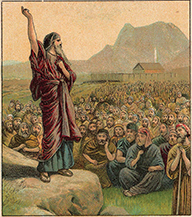×


We have detected your country as:
Please click here to go to the USA website or select another country from the dropdown list.
by: Rev. Nathan Williams, Deputy International Administration Director
As a global community, Bridges for Peace is reading through the entire Bible from cover to cover in 2019. For many Christians, reading through the Old Testament feels like an insurmountable task, especially by the time they get to the book of Leviticus and then Numbers. The trials and tribulations of the Children of Israel on their journey to the Promised Land is one that dominates the first five books of the Bible and can at times seem irrelevant to our modern-day lives. It may then come as a surprise that the apostle Paul related many of Israel’s experiences in the wilderness in his writings and wrote to the believers in Corinth that “…all these things happened to them as examples, and they were written for our admonition…” (1 Cor. 10:11). Within the first five books of the Bible we can find countless practical lessons on faith, obedience and the character of God. Let’s discover some of these lessons in the book of Numbers, lessons Paul thought important for this generation to learn.

The book of Numbers records the Israelites’ long wandering from the second year after their miraculous escape from slavery in Egypt until their eventual arrival on the banks of the Jordan River, facing the Promised Land 38 years later. It tells the story of two generations: one experienced the wonders that broke Pharaoh’s oppression but could not depart from their unfaithfulness, and the other eventually became the epitome of faith and obedience.
The name of this book is derived from the fact that it can be divided into two parts around the censuses or “numberings” of these two generations. The first part begins with a census of the first generation (Num. 1:1–46) and tells of the rebellion and disunity in their ranks. In Numbers 11–21 we find eight stories of insurrection, complaining, rebelling or grumbling:
Because of this propensity to rebel against God and Moses, everyone aged twenty years and older at the time of the first census died in the wilderness—except for Moses, Joshua and Caleb.
As the book turns a corner with the new generation’s census (Num. 26:1–65), it reveals that this generation learned from the failures of the previous one. Although the new generation was shown to fail God’s instructions regarding sins remarkably similar to those of their parents, their response when confronted with their sin was different. They had a change of heart, which resulted in different ways of acting, reacting and repenting. For their faithfulness, the new generation would receive the Promised Land that their parents had failed to attain on account of their unbelief.
In Numbers 31, the Israelites were just outside the Promised Land. As they faced one of many battles to conquer the land promised to them by God, the next test for the new generation arose. After conquering the Midianites, the fertile east bank of the Jordan River now lay firmly in the hands of the fledgling nation of Israel. Yet a major problem arose that threatened the success of the Israelites’ campaign to enter the land. The new leaders of the tribes of Reuben and Gad saw that the east side of the Jordan River had the ideal grazing lands for their multitude of livestock. They desired to settle there instead of crossing over the Jordan River into the land of Canaan: “Therefore they said, ‘If we have found favor in your sight, let this land be given to your servants as a possession. Do not take us over the Jordan’” (Num. 32:5).
Immediately this story hearkened back to the rebellion, disunity and unbelief of the previous generation and the sin of the twelve spies (Num. 14), which is quite clear from Moses’s response:
“And Moses said to the children of Gad and to the children of Reuben: ‘Shall your brethren go to war while you sit here? Now why will you discourage the heart of the children of Israel from going over into the land which the Lord has given them? Thus your fathers did when I sent them away from Kadesh Barnea to see the land. For when they went up to the Valley of Eshkol and saw the land, they discouraged the heart of the children of Israel, so that they did not go into the land which the Lord had given them. And look! You have risen in your fathers’ place, a brood of sinful men, to increase still more the fierce anger of the Lord against Israel. For if you turn away from following Him, He will once again leave them in the wilderness, and you will destroy all these people” (Num: 32:6–9, 14–15).
Moses’s apprehension is completely understandable. It seems the tribes were again acting in unbelief, desiring to settle on the east bank of the Jordan instead of conquering the land before them—just like their parents. In fact, this request could unhinge the entire process by encouraging other tribes to settle just where they were instead of walking into the fullness of the inheritance of the land that God promised to the descendants of Abraham.
If this were the previous generation of Reuben and Gad, this would be the point in the story where the heads of the tribes would raise their voices in protest, stiffen their necks and begin to rebel against Moses for his disapproval of their plan. But something remarkable happened after Moses confronted them with their sin. The new leaders of Reuben and Gad did not grow stubborn. Instead, they embraced Moses’s chastening and heeded his warnings to not repeat the sins of their forefathers. The tribal leaders returned to Moses with a revised proposal, promising not only to support their kindred in the battles ahead, but to take the most dangerous role in leading their advance into the Promised Land: “But we ourselves will be armed, ready to go before the children of Israel until we have brought them to their place…We will not return to our homes until every one of the children of Israel has received his inheritance” (Num. 32:17a–18).
As Charles Spurgeon ponders, “Kindred has its obligations. The Reubenites and Gadites would have been unbrotherly if they had claimed the land which had been conquered, and had left the rest of the people to fight for their portions alone.” The new generation of leaders is shown to be those who learned from the failures of their forefathers without berating the failures of the past or supposing themselves to be better. The new generation showed that they had learned faithfulness and patience to persevere until they had achieved all that God had promised.
Although it may seem that in the short term the tribes of Reuben and Gad had been rewarded by receiving their inheritance of land before any other tribe, a sacrifice was required. The men of the tribes had promised to go alongside their brothers into battle to conquer the land. As such, they had very little time to build fortified cities where their wives and children could dwell safely until the men returned from war. These tribesmen had to persevere to remain faithful to their promise to stand with the other tribes of Israel until all the land of Canaan was conquered. Biblical scholars surmise that it took anywhere between five to seven years for Joshua to conquer the entire land of Canaan. The Reubenites and Gadites were therefore removed from their families for an extended period of time. The fighting men had to trust that the Lord would protect their families living on the frontier while they were away.
In his article Reuben and Gad: Regrettable Choices, Jim Cole-Rous explains that their choice was driven by a desire to meet their own needs—in the best way they saw fit. “These two tribes had large herds of cattle and saw this territory as being of the very best for grazing land…Perhaps their choice was based on their lust to have to themselves what they saw as the most advantageous to themselves.” In this case, Reuben and Gad wanted what God had not planned for them. Was there no suitable pastureland on the west of the Jordan? As Iain Duguid puts it: “The temptation that faced the Reubenites and the Gadites was to settle in a place dictated by their possessions, not by the Lord’s promise. It was ultimately economics that was driving their request, not theology. In effect they were asking to settle down somewhere other than where God had called them to live because it was more suitable for their lifestyle.”
Cole-Rous further argues that they paid the price of freedom for their choice. “Having remained on the east [side] of the Jordan, they were vulnerable to attack by marauding bands, as they soon found out…” In 2 Kings 15:29 we read that Gilead, referring to the land which belonged to the tribes of Reuben and Gad, was conquered by Tiglath-Pileser, king of Assyria, and the people were taken captive to Assyria. While God intended to bless the Reubenites and Gadites, their choice to settle the land east of the Jordan—although honorable in their dealings with Moses—ultimately brought nothing but problems, bloodshed and bondage.
Just as the older generation of ex-slaves showed themselves to be stiff-necked, testing God at every turn, so the Lord gives a powerful testimony of His patience and grace. The Lord remains consistent in character to both the rebellious and the obedient generations of His people—disciplining the stubborn, but never abandoning His covenant or pouring out blessings far beyond what is deserved. Indeed the Lord tested their perseverance and faith, and though the people failed many times, God revealed His own faithfulness by His constant presence, leading the way through the cloud by day and the pillar of fire by night. The Lord never forgot nor forsook His people.
The chronicles from the book of Numbers should perhaps be a stark reminder to this generation that God does not tolerate rebellion, complaining or disbelief without invoking consequences. To the same end, the Lord is slow to anger, rich in mercy and faithful to those who walk in obedience. Throughout the wilderness experience, God was teaching His people how to walk with Him. Not only did the Lord provide for their physical needs, He also taught them to worship Him, serve one another and live lives that were a witness to the surrounding nations. He was their God, they were His people and He expected them to act like it.
 Wikipedia describes patience as “the state of endurance under difficult circumstances such as: perseverance in the face of delay; tolerance of provocation without responding in annoyance/anger; or forbearance when under strain, especially when faced with longer-term difficulties.”
Wikipedia describes patience as “the state of endurance under difficult circumstances such as: perseverance in the face of delay; tolerance of provocation without responding in annoyance/anger; or forbearance when under strain, especially when faced with longer-term difficulties.”
Recently a close friend said to me: “I am so tired of waiting on God.” My friend had a decision to make and trusted the Lord for breakthrough and an answer for direction. But as he received no response from the Lord in his desired time frame, he soon became impatient and went with what looked good to him. I thought about the story of Reuben and Gad, about choosing something outside the perfect will of God, about their commitment and perseverance in their choice, but also about the long-term consequences of that choice. As believers we are frequently faced with the temptation to grab the good enough instead of God’s best, and often it is a question of patience.
Leaders in the spiritual, economic and political realms generally believe patience is an essential characteristic of successful people. In a simplified way, patience is the ability to acknowledge that things take time and to recognize there is a chance of frustration in the process that will require perseverance. Since the advent of the digital age and the ever-present smartphone, there appears to be an increasing inability to practice patience.
Millennials (the generation born between 1982 and 2004) have become the largest demographic in the US workforce for more than two years now. They carry with them stereotypes of being entitled, difficult to please and notorious for job hopping. While the first two statements are gross generalizations, the third is a fact. According to Gallup Polls, 21% of millennials have changed jobs within the past year, which is nearly three times higher than generations outside this demographic. While the reasons for job hopping are varied, there is a concerning trend that if it’s not working out for them, millennials jump ship for greener pastures. Being challenged by frustrations once thought common in the workplace, millennials view these as insurmountable, and when faced with a decision of fight or flight, flight is the go-to response.
Social media and smart devices are rewiring our brains by constant interaction and digital distraction. A recent online survey by dscout research analysts found the total time spent by an average American on social media per day is now above 2.5 hours. We tap our phones 2,617 times per day and our attention span is down to eight seconds. The brain is a malleable organ that develops even in adulthood. And we have now trained ourselves to focus in such short bursts, to switch tasks so regularly, that many of us are entirely incapable of selecting a single goal and pursuing it with persistence and patience.
Our society further perpetuates a myth of instant success. YouTube and Instagram are filled with stories of young people who have purportedly achieved overnight success. Companies like Uber exploded in popularity in just a few years and the founder is now worth over US $1 billion. What we rarely hear in the mass media is the years of hard work, long hours and patience it requires to achieve our goals. Because we as individuals have come to expect things to happen overnight, we consider our own inability to achieve this false reality. This further breeds a lack of persistence, and in turn we become impatient with our slow progress. The time-honored ability to be patient has started to fade into history.
 We are faced with many challenges in our generation—most of all, a society that believes we can live perfectly content lives, achieving anything we put our minds to, even outside the constructs of obedience to the Word of God. It looks so pleasing to become one of the overnight successes that are paraded on social media. There is a concern in my heart for my generation, my friend included. Will we have the perseverance to keep our faith alive until we see God’s promises for our lives and this world fulfilled? Will we settle for the good enough that the world has to offer outside the Promised Land? This was perhaps the greatest sin of Reuben and Gad. They were happy outside the perfect will of God—happy with what was physically pleasing, letting their possessions dictate their choices.
We are faced with many challenges in our generation—most of all, a society that believes we can live perfectly content lives, achieving anything we put our minds to, even outside the constructs of obedience to the Word of God. It looks so pleasing to become one of the overnight successes that are paraded on social media. There is a concern in my heart for my generation, my friend included. Will we have the perseverance to keep our faith alive until we see God’s promises for our lives and this world fulfilled? Will we settle for the good enough that the world has to offer outside the Promised Land? This was perhaps the greatest sin of Reuben and Gad. They were happy outside the perfect will of God—happy with what was physically pleasing, letting their possessions dictate their choices.
The story of Reuben and Gad is convicting but also encouraging. It is a testimony to the steadfast love of God for His people in both discipline and blessing. It portrays to us that although we may settle outside the perfect will of God, He will continue to reward our faithfulness. Even though we will need to bear the consequences of our choices, the Lord will never leave us nor forsake us. Perhaps Cole-Rous says it best: “If you have been making ‘good’ enough choices instead of ‘God’s Best,’ this might be the best time to turn your heart toward the Lord who longs to give you better than you or I deserve.”
Cole-Rous, Jim. “Reuben and Gad: Regrettable Choices.” Global Christian Center. http://globalchristiancenter.com/christian-living/lesser-known-bible-people/31311-reuben-and-gad-regrettable-choices
Spurgeon, Charles. Morning and Evening: An Updated Edition of the Classic Devotional in Today’s Language. Nashville: Thomas Nelson, 1994.
Duguid, Ian. Numbers: God’s Presence in the Wilderness. Wheaton: Crossway Books, 2012.
Wikipedia: The Free Encyclopedia. “Patience.” Wikipedia.com. https://en.wikipedia.org/wiki/Patience
Daily Pay. “Turnover and Retention Rates for Millennials in the Workplace.” dailypay. https://business.dailypay.com/blog/turnover-rates-for-millennials
Winnick, Michael. “Putting a Finger on Our Phone Obsession.” dscout. https://blog.dscout.com/mobile-touches
All logos and trademarks in this site are property of their respective owner. All other materials are property of Bridges for Peace. Copyright © 2024.
Website Site Design by J-Town Internet Services Ltd. - Based in Jerusalem and Serving the World.